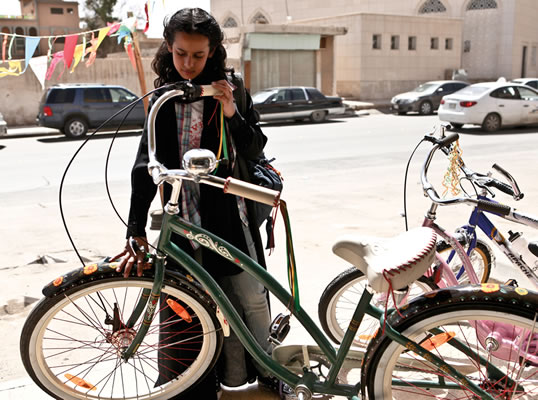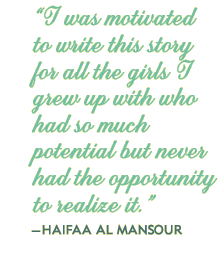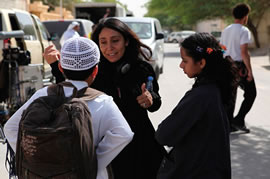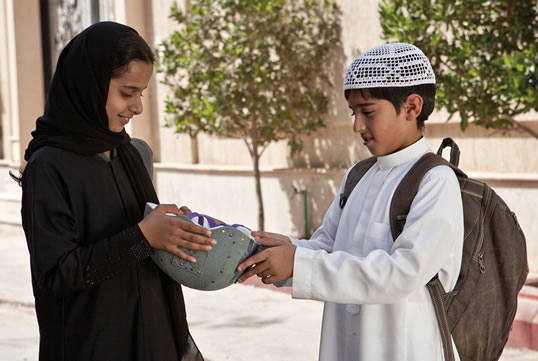
 |
| tobiaS kownatzki / razorfilm |
| Actress Waad Mohammed’s performance in her title role has received nearly universal acclaim. Above: She finds the green bicycle that becomes her dream. |
It is 10-year-old Wadjda’s usual morning walk to school through her Riyadh neighborhood when Abdullah—her neighbor and best friend—pedals up on his bike and playfully snatches her headscarf. “Come get it!” he teases. “I would if I had a bike!” she calls after him. “Don’t you know girls don’t ride bikes?” he replies. Watching him ride off, Wadjda’s dream is born. She later tells Abdullah that she will save enough money to buy her own bike, and then she will challenge him to a race. Her quest, against the disapproval of both her mother and her school, sets in motion a rich, layered plot that illuminates Saudi culture and customs, and our common humanity.
 Released last year and winner, to date, of 16 awards around the world, Wadjda is the first feature film by 39-year-old Saudi director Haifaa Al Mansour, the first feature to be filmed entirely in Saudi Arabia with an all-Saudi cast, the first by a female director and the first film ever to be submitted to the Oscars from Saudi Arabia.
Released last year and winner, to date, of 16 awards around the world, Wadjda is the first feature film by 39-year-old Saudi director Haifaa Al Mansour, the first feature to be filmed entirely in Saudi Arabia with an all-Saudi cast, the first by a female director and the first film ever to be submitted to the Oscars from Saudi Arabia.
Al Mansour gives much credit to social changes in the kingdom for the success of her production. “I never could have shot this film in Riyadh 10 years ago,” she says. “There are so many reasons to be excited and optimistic about the future of the kingdom, and I hope this film reflects that.”
 |
| tobiaS kownatzki / razorfilm |
| Al Mansour advises Abdulrahman Al-Gohani, who plays Abdullah, and Mohammed during shooting in Riyadh. |
Wadjda takes viewers inside the life of a middle-class Saudi family. Wadjda is an only child, and she attends a traditional religious girls’ school, where she is sharply shamed by her headmistress for her subtle rebellions—tomboy Converse sneakers, pop mixtapes, braided bracelets with sports-team colors and, most of all, for her outlandish dream of owning a bicycle. Wadjda’s mother is an endearing woman whose long, hot commutes to her job are made worse by her driver’s impatience, and though she is still smitten with her husband, she is wounded by his deep yearning for a son—by a second wife. Abdullah is sweet, loyal and charming as Wadjda’s friend, and he becomes her ally when he secretly teaches her to ride his bicycle on the rooftop of her house, both oblivious of what their genders imply in their world, portrayed as one in which triumphs and defeats transpire realistically, and tradition and progressiveness interact thoughtfully.
“The events surrounding the story are real, raw and authentic to the point that it shocks me as a Saudi, because there is none of the sugar-coating or glossing over that you find in many movies,” says artist Manal Al Dowayan, who, like Al Mansour, grew up in Saudi Arabia’s Eastern Province.
Al Mansour explains that the bicycle “is a metaphor for an unrealized dream. I hope that anyone who has ever worked to realize an impossible goal will be able to relate to Wadjda’s journey.” For Al Mansour, the bicycle—which is painted green, perhaps coincidentally the color of the Saudi flag—represents freedom of movement, both physically and socially. Youthful yet traditional, “the bicycle is also a toy in some ways, so it should not be seen as something threatening or harmful.” Wadjda’s perseverance is heroic, and her smile is infectious. Audiences empathize with Wadjda’s struggles and ordeals, which are ultimately resolved by a surprising act of maternal love that tenderly triumphs over fears of judgment.
And then there is the bike race, as gentle and symbolic as the rest of the film. Wadjda speaks for herself and perhaps her generation when she calls back to Abdullah, “Catch me if you can!”
Wadjda is in these ways a serious film that sheds newly candid, thoroughly empathetic light on marriage, family, education, work, religion and love. The universal emotion that touches audiences blurs nationality, race and religion. On the popular us-based film website www.rottentomatoes.com, the overall reviewer rating is 99 percent positive. “It’s a movie that’s almost miraculous in the way it subverts our images and expectations of Saudi life,” wrote Marc Mohan for the The Oregonian. Duane Dudek of the Milwaukee, Wisconsin Journal-Sentinel observed that Wadjda “is not so much consciously rebelling against authority as expressing individuality, like a Saudi Lisa Simpson.” At the Detroit News, Tom Long wrote, “Yes, this is a movie about Saudi Arabia. But more importantly, it’s a movie about life.”
 |
| tobiaS kownatzki / razorfilm |
| In his first gesture of what will become admiring support of Wadjda's determination to learn how to ride, Abdullah gives her a helmet. Opposite, far left: Waad Mohammed receives the Dubai International Film Festival's 2012 award for best actress in a feature film from HH Sheikh Mansoor bin Mohammed bin Rashid Al Maktoum. Sidebar, below: Waad Mohammed receives the Dubai International Film Festival's 2012 award for best actress in a feature film from HH Sheikh Mansoor bin Mohammed bin Rashid Al Maktoum. |
To Saudi women viewers, however, Wadjda is a more personal film. Dina Juraifani, from al-Qassim in the Eastern Province, admits, “It happened to us, just like the movie exactly, and it still happens today, but it all depends on how your family thinks.” Similarly, fashion designer Daneh Buahmad, proud aunt of Abdulrahman Al-Gohani, who plays Abdullah in the film, admits that “during some parts of the movie, I was worried what ‘the West’ would think of us [Saudis], but it is a touching story about a girl and her mother, and I think every woman can relate. It shows a true side of Saudi Arabia and touches on so many issues while revealing a very human side. I had tears rolling down my face, and I think it was the same for many people who watched the movie. I am so proud of Haifaa because she has succeeded to make a movie that happened in Saudi Arabia but tells a story everyone can somehow relate to.”
Al Mansour explains that in Saudi Arabia “people wear jeans and teenagers roll their eyes at their parents just like everywhere else. There are so many stories to tell that people don’t know.” Ahd Kamel, a Saudi film director herself who also acts the role of the coldly pious headmistress, adds, “We are humans. We love and we fear. Saudi Arabia is not black or white. It is a very complex culture with many different ethnic groups and cultural traditions.”
With Wadjda showing in world cinemas and film festivals and submitted for nomination for an Oscar, is it poignant that it is not showing publicly in Saudi Arabia, where there are no commercial cinemas? While this baffles many, Sultan Al-Bazie, director of the Saudi Arabian Society for Culture and Arts, is delighted that his organization’s non-governmental nominating committee, which he also chairs, chose Wadjda as Saudi Arabia’s first official submission to the Oscars. Al-Bazie believes Wadjda has a chance there. The Academy of Motion Picture Arts and Sciences wants local and independent films, he says, and Wadjda “is a very good movie with an important story that has a palpable presence. It has won many awards at film festivals around the world, and this challenge, in addition to Haifaa’s courage in dealing with the situation in Saudi Arabia, a country without cinemas, is impressive.” Al Mansour, he adds, has opened new and exciting opportunities for Saudi filmmakers.
Might those opportunities one day include the opening of commercial cinemas? “Saudi Arabians have always been open to cinema, fashion and other art forms via satellite, travel abroad and other means,” says Al-Bazie. “And all Saudis have opinions about movies.” Dvds are available to rent or buy, Saudis download movies via satellite and Internet, and they visit cinemas during travels abroad. Al Mansour, however, is pensive on the matter. “It is like the ban on women driving. It is a high-profile issue, and both sides are passionate about it, so it lingers without being solved…. When it is time, it will happen.” Most important, she adds, is that now, “there is a large platform for women, who can come forward while still being sensitive to cultural norms.” She does not believe aggressive protests or campaigns are an effective way to win change in a traditional, tribal and conservative country that is only 80 years old.
And so it was that, like many Saudis, Abdullatif Abdulhadi enjoyed a digital download of the film recently at a friend’s home. “This is an excellent movie that touches on many of the social issues that exist in Saudi Arabia, and it’s presented in a very casual and simple script.”
Although this story carries so much subtext, Al Mansour underlines her simple desire that audiences enjoy the story and feel hopeful and motivated. “I want people to walk away with the power of dreaming and being happy. Change happens by working hard.” This is a theme that has no borders.
 |
Leila Al-Habbal ([email protected]) grew up as an "Aramco brat" in Dhahran, Saudi Arabia, went to school at Phillips Exeter Academy and earned a ba in journalism from George Washington University. She now lives in Dhahran and works as a freelance writer and editor specializing in regional social issues. |





